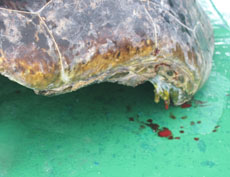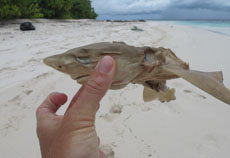The Hulhumale Magistrate Court has ordered that former President Mohamed Nasheed be confined to Male’, ahead of a court case concerning his detention of Chief Judge Abdulla Mohamed while in office.
“It’s a notice to the accused issued by the Hulhumale’ court and restricts his movements to Male’ City. The notice says he can only travel out of Male’ City with the prior permission of the Hulhumale’ Court,” said Chairperson of Nasheed’s Maldivian Democratic Party (MDP), Mariya Ahmed Didi.
Meanwhile, Nasheed was also summoned to the Civil Court on October 2 accused of defamation, for allegedly calling Defence Minister Mohamed Nazim a “traitor”. Police Commissioner Abdulla Riyaz has filed a similar case.
The restriction on Nasheed’s movements comes days before the party is due to begin its election campaign in the southern atolls, and days after Nasheed’s return from the UK where he met Foreign Secretary William Hague and spoke at the Royal Commonwealth Society.
“This is very serious for us as a party, because we have a huge campaign coming up in the south, from October 1-13,” explained the party’s spokesperson, Hamid Abdul Ghafoor, observing that a third of the party’s MPs also faced court action.
“We plan to visit most of the islands in the southern two provinces, and it’s all been scheduled. This all looks very ‘Myanmar’ – using the courts and administrative manipulation to restrict political party activity. At a time when President Waheed is lobbying the Commonwealth to remove the Maldives from its human rights watch-list, his regime has detained the leader of the opposition.”
President’s Office Media Secretary Masood Imad told Reuters that the ruling was a judicial matter and that the government would not interfere.
However Ghafoor contended that while “Waheed likes to hide behind the fig leaf of judicial independence, the UN Human Rights Council, Amnesty International and other NGOs have highlighted that the judiciary is bias and effectively controlled by elements in the regime.”
The Department of Judicial Administration has meanwhile told local media that the travel ban was routine for defendents in upcoming court cases.
“It is standard procedure followed by all courts to necessitate those accused in a case to obtain permission from the relevant court to leave the country under Article 23 and 24 of the Court regulation,” a court official told Haveeru.
Nasheed, together with former Chief of Defense Forces Moosa Ali Jaleel, retired Brigadier-General Ibrahim Mohamed Didi and Colonel Mohamed Ziyad, are accused of illegally detaining Chief Criminal Court Judge Abdulla Mohamed during Nasheed’s final days in office.
Nasheed’s government accused the judge of political bias, obstructing police, stalling cases, having links with organised crime and “taking the entire criminal justice system in his fist” so as to protect key figures of the former dictatorship from human rights and corruption cases.
Nasheed justified the judge’s arrest based on his constitutional mandate to protect the constitution, after the Judicial Services Commission (JSC) complied with an injunction from the civil court preventing further investigation of the judge for ethical misconduct, and the failure of Parliament’s Independent Commissions Committee to hold the judicial watchdog accountable.
The then-opposition began nightly protests over the matter, while the government sought assistance from the UN and Commonwealth for urgent judicial reform. However Nasheed resigned on February 7 amid a police and military mutiny the day after the Commonwealth team arrived.
General Didi, who was serving as the Male’ area commander at the time of Judge Abdulla’s arrest, penned his “premature” resignation” after 32 years of service in the military upon the Prosecutor decision to prosecute him.
Ex-Chief of Defence Force Jaleel had also retired following the controversial transfer of power on February 7, while Colonel Ziyad has maintained he would be present in his uniform to defend himself in the court.
The case was sent to Hulhumale Court rather than the Criminal Court in Male’ due to apparent concerns over a conflict of interest, however it was initially rejected by the court on the courts it did not have the jurisdiction to hear the case.
The court was obliged to accept the case on resubmission by the Prosecutor General after a High Court appeal. Despite the case being sent to Hulhumale, the trial is to be held in the Justice Building in Male’.
Nasheed has specifically been charged with violating Article 81 of the Penal Code, which states that the detention of a government employee who has not been found guilty of a crime is illegal.
If found guilty, Nasheed will face a jail sentence or banishment for three years or a Rf 3000 (US$193.5) fine, a sentence that would bar him from contesting the elections.

